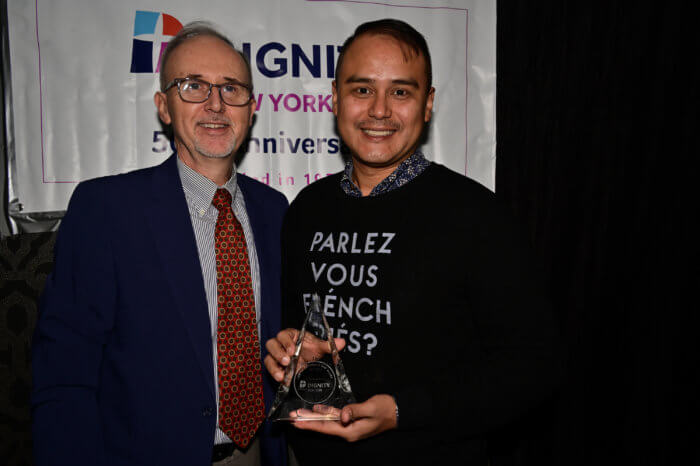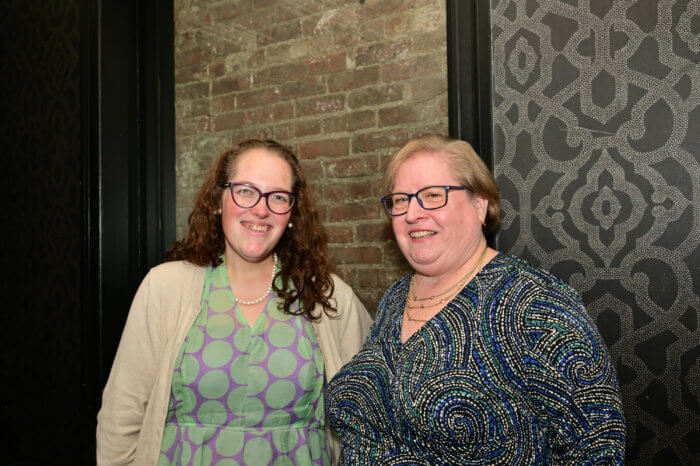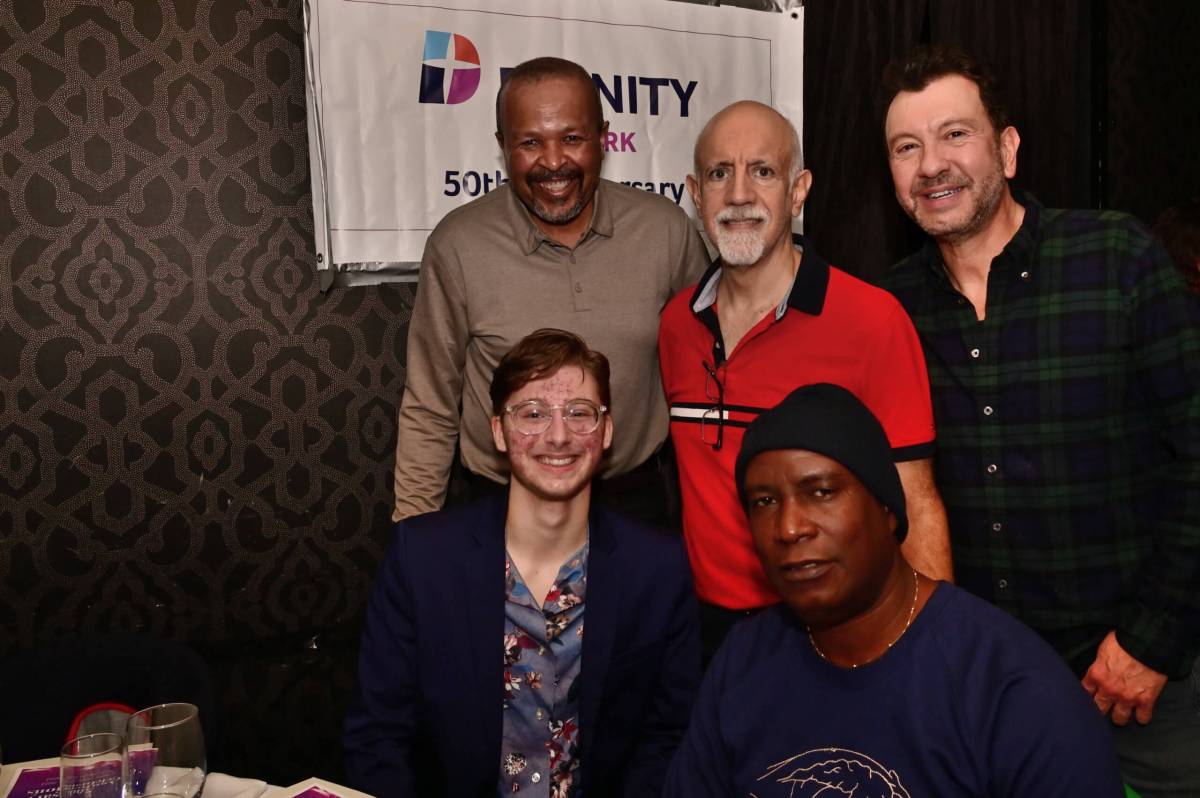Dignity New York is one of the LGBTQ Catholic communities kicking off golden anniversary celebrations this year and in 2023.
In October, Dignity NY celebrated its 50th anniversary with a special sold-out dinner with 60 attendees at Bocca Di Bacco restaurant in Chelsea October 23. The dinner was followed by a liturgy attended by 100 members at St. John’s in the Village — and it was also streamed virtually.
DignityUSA‘s out lesbian leaders, executive director Marianne Duddy-Burke and board president Meli Barber, were in attendance to celebrate the occasion.
The Episcopal parish has served as Dignity NY’s home for 34 years since the 1987 expulsion from Chelsea’s St. Francis Xavier at 30 West 16th Street.
The community has about 100 core members. Some members attend high holy day mass and others casually go to liturgies, Jeff Stone, volunteer secretary and director of media relations of Dignity NY, told Gay City News.
Barber delivered the celebratory 50th anniversary liturgy as a lector reading the story “The Pharisee and the Publican” from Luke 18:10-14 and congratulating Dignity NY on its 50th anniversary to applause at the church.
“Eucharist means thanksgiving,” she said. “When I think about your community and these last five decades, we have so much to be grateful for.”
“There are so few queer organizations that make it to 50,” said Duddy-Burke, who has led DignityUSA for 15 years. “It’s really a milestone that is very important to mark and to celebrate.”
It’s a sin
DignityUSA celebrated its 50th anniversary in 2019. Prior to Dignity, LGBTQ Catholics gathered in people’s homes and in various parishes to practice their faith in the 1960s.
“There were lots and lots of ‘good Catholic boys and girls,’ as they consider themselves, who wanted to maintain a connection with the church,” said Stone, a 67-year-old gay man who has been a member of Dignity NY since 1988. “[They] felt that their sexuality should not be an obstacle for that, which of course, it certainly was as far as the institution was concerned.”
In 1969, former Augustinian priest Patrick X. Nidorf, who was also a psychologist, started leading meetings in San Diego. In 1970, the late Father John McNeill, a Jesuit theologian, published works about LGBTQ Catholics and the church. Nidorf established the first official Dignity community in a parish in Los Angeles that same year. McNeill helped establish the New York community in 1972 and was influential in establishing DignityUSA.
“He was a central figure in the founding of the New York chapter as well as the whole Dignity national movement,” Stone said.

Dignity communities sprung up in welcoming Catholic parishes across the country from 1972 until 1986.
Fr. McNeill was influential establishing New York’s community in 1972. In 1986, Joseph Cardinal Ratzinger, who later became Pope Benedict XVI, pushed Dignity out of the Catholic church in an infamous “Halloween letter” sent to the bishops of the Catholic Church where he demonized homosexuality. The Vatican expelled Dignity from Catholic parishes after a yearlong struggle among churches and church leadership in 1987. Fr. McNeill was also expelled from his order that year.
“It was a very harsh document,” Stone said, stating that it didn’t name Dignity specifically, but the “implication was very clear that certain groups were causing confusion among the faithful about what the real teachings of the Church were.”
New York’s community was expelled from St. Francis Xavier church after being ordered by the archdiocese to do so. Dignity NY held an Exodus mass at the church in March 1987.
The Vatican’s move provoked many LGBTQ Catholics to leave the church, Stone said.
The faithful at Dignity NY landed at St. John’s in the Village. Today, St. Xavier has an active LGBTQ ministry.
Dignity NY is one of 37 communities across the US registered with DignityUSA. It is operated by six steering committee members who oversee the $41,000 yearly budget, according to a 2018 IRS 990 form, the most recent information available.

Not turning the other cheek
Duddy-Burke said New York’s community is especially important to Dignity’s overall image.
“New York is such a visible place [and] having a large, visible, and visionary group there is really important. It really helped put DignityUSA on the national map,” she said.
Through the decades, the New York community was active in pivotal LGBTQ rights battles and developing leaders in the LGBTQ movement. One Dignity member, Father Robert Carter, became a founder of the National LGBTQ Task Force. For decades, the community has conducted a Pride liturgy on the steps outside New York’s iconic St. Patrick’s Cathedral, and they brought forth a legal case that ultimately allowed them to demonstrate in front of the church.
“That was the first ruling for queer groups to be able to have public witness,” said Duddy-Burke. “It’s obviously been important for LGBTQ plus Catholics to have this witness outside of St. Patrick’s. That’s like the Church of the United States and probably the most famous Catholic Church in the US.
“That’s just one example of how pivotal having that chapter in New York has been,” she added.
Members of the community participated in the fight to march in New York’s main annual St. Patrick’s Day Parade. Parade organizers ended the longtime ban ended in 2014 (though Staten Island’s St. Patrick’s Day Parade still maintains a homophobic policy). Members pushed New York City and the state for sexual orientation to be included in anti-discrimination and human rights laws, and they fought for same-sex marriage among other battles for rights.
Dignity NY kept its faith even during the church’s sexual abuse scandal. The church added salt to the wound of centuries of shunning and shaming of LGBTQ people where LGBTQ Catholics were scapegoated and forced to defend themselves.
The church’s sexual abuse scandal hit Dignity NY when then-Dignity NY member and openly gay Father Bernard Lynch was acquitted after being accused of having improper relations with one of the students as a chaplain at a Catholic High School in the Bronx. Fr. Lynch now lives in London with his husband.
“We had to explain over and over and over again being gay doesn’t mean you want to have sexual relations with children or teenagers,” Stone said. “That was a very traumatic event for Father Lynch and for the entire Dignity New York community.”
The debate about LGBTQ Catholics in the church continues today. Pope Francis has indicated an openness to LGBTQ Catholics and requested forgiveness for the way the church has treated queer people.
Stone believes Dignity NY’s primary influence through the decades has not been with church leaders, but with everyday Catholics.
“That’s who we’re talking to,” Stone said.
Next 50
Dignity NY and DignityUSA are growing, unlike the Catholic church, which is losing members, Duddy-Burke and Stone said.
Duddy-Burke called going virtual a “gift of the pandemic.”
“It really created some opportunity for us to reach new people, younger people, and to start pushing our leaders forward to carry us through our next 50 years,” she said.
“If they’re going to be in a spiritual community, it better be inclusive and affirming of all people and open it,” Duddy-Burke said.
Barber, a 37-year-old lesbian who was born after DignityUSA established itself as an independent Catholic community separate from the church, expressed gratitude during her reading. Dignity was there for her when she came out.
“Arms [were] open, waiting to embrace us, and so for that, I’m eternally grateful,” she said. “Dignity New York. you are the hands and heart of Christ as you embrace and love as God loves. As you look ahead to the next 50, I pray that you’ll continue to be the hands, the feet, the voice, the body, and the heart of Christ as well.”































